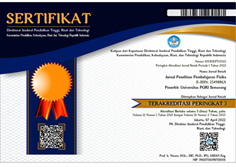Implementasi PBL Terintegrasi STEM dengan Flipped Classroom untuk meningkatkan Kemampuan Berpikir Sistem Siswa SMA pada Topik Usaha dan Energi
Abstract
This study aims to determine the effect of implementing STEM integrated PBL with Flipped Classroom to improve high school students' system thinking skills. The samples in this study were students of class X MIPA 2 and X MIPA 3 SMA Al-Kautsar Bandar Lampung in the academic year 2021/2022. The research design used is One Group Pretest Posttest. The data collection instrument used was a multiple-choice test sheet. The results showed that learning the STEM approach with the flipped classroom strategy was able to improve students' system thinking skills, this can be seen from the average N-gain value in the experimental class of 0.65, which is greater than the control class with an average N-gain value of 0.55 with medium category. This shows that the system thinking ability of the experimental class is more improved than the control class. Also, supported by data from the results of the Independent simple T-test hypothesis test, the Sig value is obtained. (2-tailed) of 0.000 means that the implementation of STEM integrated PBL with flipped classroom can improve students' system thinking skills on the topic of effort and energy.
Keywords: PBL, STEM, Flipped Classroom.
Full Text:
PDFReferences
Jayadi A, Putri D H dan Johan H 2020 Identifikasi pembekalan keterampilan abad 21 pada aspek keterampilan pemecahan masalah siswa sma kota bengkulu dalam mata pelajaran fisika J. Kumparan Fisika 3 25-32
Saharsa U, Qaddafi M dan Baharuddin B 2018 Efektivitas Penerapan Model Pembelajaran Problem Based Learning Berbantuan Video Based Laboratory Terhadap Peningkatan Pemahaman Konsep Fisika JPF (Jurnal Pendidikan Fisika) Universitas Islam Negeri Alauddin Makassar 6 57-64
Diani R, Khotimah H, Khasanah U dan Syarlisjiswan M R 2019 Scaffolding dalam Pembelajaran Fisika Berbasis Problem Based Instruction (PBL): Efeknya Terhadap Pemahaman Konsep dan Self Efficacy Indonesian Journal of Science and Mathematics Education 2 310–319
Estapa A T dan Tank K M 2017 Supporting integrated STEM in the elementary classroom: a professional development approach centered on an engineering design challenge International Journal of STEM Education 4 1-16
Listiana L, Abdurrahman, Suyatna A dan Nuangchalerm P 2019 The Effect of Newtonian Dynamics STEM-Integrated Learning Strategy to Increase Scientific Literacy of Senior High School Students J. Ilmiah Guruan Fisika Al-Biruni 8 43–52
ApriyantiY, Nyeneng I dan Suana W 2017 Pengembangan Perangkat Pembelajaran Flipped Classroom Pada Materi Getaran Harmonis J. Pembelajaran Fisika Universitas Lampung 5
Sinmas W F, Sundaygara C dan Pranata K B 2019 Pengaruh PBL Berbasis Flipped Class terhadap Prestasi ditinjau dari Motivasi Belajar Siswa Rainstek: J. Terapan Sains dan Teknologi 1 14-20
Clark S, Petersen J E, Frantz C M., Roose D, Ginn J, dan Rosenberg Daneri D 2017 Teaching systems thinking to 4th and 5th graders using Environmental Dashboard display technology PloS one 12
Rokhaniyah H 2017 Flipped Classroom: Can It Optimize Students’ Ability To Find Out Main Ideas In Listening Comprehension J. Pendidikan 8 179-182
Bybee R W 2011 Scientific and engineering practices in K-12 classrooms: Understanding a framework for K-12 science education Science and Children 49 10.
Hau R R H 2021 Identifikasi Penerapan Teori Belajar Dalam Pembelajaran Fisika J. Pendidikan Fisika dan Sains 3 8
Permanasari A 2016 STEM Education: Inovasi dalam Pembelajaran Sains Pros Seminar Nasional Pendidikan Sains 23-34
Khoiriyah N 2018 Implementasi Pendekatan Pembelajaran STEM Untuk Meningkatkan Kemampuan Berpikir Kritis Siswa Sma Pada Materi Gelombang Bunyi. J. Riset dan Kajian Pendidikan Fisika 5 53-62
Putri C D, Pursitasari I D dan Rubini B 2020 Problem based learning terintegrasi STEM di era pandemi covid-19 untuk meningkatkan keterampilan berpikir kritis siswa JIPI (Jurnal IPA & Pembelajaran IPA) 4 193-204
Meilinda M 2021 Development and validation of climate change system thinking instrument (CCSTI) for measuring system thinking on climate change content Journal Of Physics 1-10
Skinner E, Saxton E, Currie C dan Shusterman G 2017 A motivational account of the undergraduate experience in science: Brief measures of students self-system appraisals engagement in coursework and identity as a scientist International Journal of Science Educatio 39 2433–2459
Garner P W, Gabitova N, Gupta A dan Wood T 2018 Innovations in science education: infusing social emotional principles into early STEM learning Cultural Studies of Science Education 13 889-903
York S, Lavi R, Dori Y J dan Orgill M 2019 Applications of systems thinking in STEM education. Journal of Chemical Education 96 2742-2751
Abdurrahman A, Nurulsari N, Maulina H dan Ariyani F 2019 Design and validation of inquiry-based STEM learning strategy as a powerful alternative solution to facilitate gift students facing 21st century challenging Journal for the Education of Gifted Young Scientists 7 33-56
Fernandu D E, Abdurrahman A dan Lengkana D 2022 Design and Validation of STEM Integrated e-Modules on Environmental Pollution to Improve Problem-Solving Skills. J. Pendidikan MIPA 23 754-765
DOI: https://doi.org/10.26877/jp2f.v13i2.12518
Refbacks
- There are currently no refbacks.
Copyright (c) 2022 Jurnal Penelitian Pembelajaran Fisika

This work is licensed under a Creative Commons Attribution-ShareAlike 4.0 International License.
Attention:
Starting vol. 15 issue 4 October 2024 JP2F has moved to a new website address
https://journal2.upgris.ac.id/index.php/jp2f/index
The submission process will only be served on the web above.
Copyright of Jurnal Penelitian Pembelajaran Fisika ISSN 2086-2407 (print), ISSN 2549-886X (online)
Gedung Utama GU.2.01 FPMIPATI, Universitas PGRI Semarang
Jl. Lontar No. 1-Dr. Cipto, Kampus 1 UPGRIS, Semarang
Email: jp2f@upgris.ac.id









